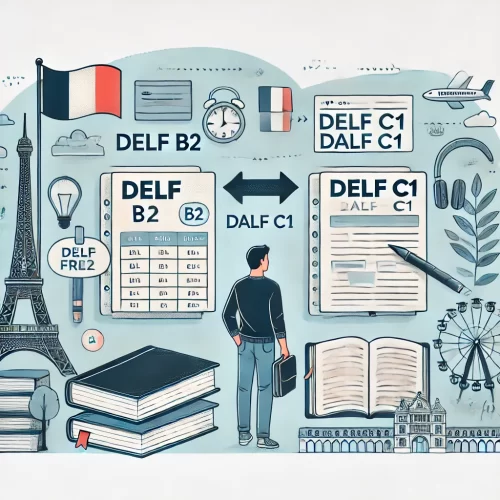Transitioning from DELF B2 to DALF C1 is an exciting journey for learners who are serious about achieving higher proficiency in the French language. While DELF B2 certifies that you are an independent user who can express ideas and understand complex discussions, DALF C1 is a step further, demonstrating advanced language skills that approach native-level fluency. Achieving this level requires determination, a structured approach, and consistent practice. Here’s a guide on how to effectively make the leap from B2 to C1.
1. Understand the Differences Between DELF B2 and DALF C1
Before diving into preparation, it’s important to know what sets DALF C1 apart from DELF B2:
a) Complexity and Depth
- DELF B2 assesses your ability to understand and discuss complex topics, but with limitations in handling subtle nuances.
- DALF C1, on the other hand, requires the ability to comprehend intricate details, form sophisticated arguments, and handle abstract and technical language with ease.
b) Test Structure
- DELF B2 has listening, reading, writing, and speaking sections that test your independent use of French.
- DALF C1 includes similar sections but at a much higher level. For instance, you are expected to write structured essays and give detailed oral presentations that require analytical thinking.
2. Expand Your Vocabulary and Grammar
A robust vocabulary and strong grasp of grammar are essential for DALF C1:
- Learn Specialized Vocabulary: C1-level tasks often include topics on politics, science, and culture. Make flashcards for advanced words and phrases that cover these areas.
- Master Complex Grammar Structures: At C1, you need to confidently use subjunctive moods, complex tenses, and nuanced conjunctions. Practice these through advanced grammar workbooks and online resources.
3. Improve Your Listening Skills
Listening comprehension at the C1 level requires being able to follow fast-paced and nuanced conversations, including radio shows, podcasts, and news reports. To improve:
- Listen to French News Daily: Follow channels like France 24 or RFI and make notes of new expressions.
- Watch French TV Series and Documentaries: Shows like C dans l’air or documentaries on ARTE can expose you to a range of formal and informal language.
- Use Podcasts and Audiobooks: Listen to podcasts such as Affaires Sensibles or audiobooks read by native speakers. Try to summarize what you’ve heard to test your understanding.
4. Enhance Your Reading Comprehension
C1-level reading involves understanding long and detailed texts that might include academic articles or essays. Here’s how to build your reading skills:
- Read French Newspapers and Magazines: Publications like Le Monde, Libération, and Le Figaro offer articles with complex language and thought-provoking content.
- Study Academic Articles: Websites like Cairn.info provide access to academic papers on various topics. Practice identifying main ideas, supporting details, and the author’s arguments.
- Annotate What You Read: As you read, underline new words, make notes, and summarize paragraphs to reinforce comprehension.
5. Develop Your Writing Skills
Writing at the DALF C1 level involves producing well-structured and coherent essays or reports on specific topics. To refine your writing:
- Practice Writing Essays: Write essays on topics like climate change, cultural differences, and current events. Follow a structured format: introduction, main body with arguments and examples, and a conclusion.
- Get Feedback: Join French language forums or find a language exchange partner who can review your writing. Professional feedback will help identify areas for improvement.
- Use Writing Prompts: Challenge yourself with prompts that require critical thinking, such as analyzing the pros and cons of a societal issue or explaining a complex idea in French.
6. Sharpen Your Speaking Skills
Speaking at the C1 level means you need to articulate your thoughts clearly and persuasively. Here’s how to boost your speaking ability:
- Practice with Native Speakers: Engage in conversation with French-speaking friends or tutors. Apps like iTalki and language exchange meetups can help you find partners.
- Prepare for Presentations: Practice speaking on various topics as if you’re presenting in front of an audience. Record yourself and listen for areas that need improvement, such as pronunciation and sentence flow.
- Simulate Exam Conditions: Practice by speaking on a topic for 10-15 minutes without interruption, then answer questions related to it. This simulates the oral section of DALF C1.
7. Develop Critical Thinking
At C1 level, you need to go beyond understanding and expressing basic opinions. You must be able to:
- Analyze Arguments: Practice reading articles and identifying the main argument, counterarguments, and the evidence used to support them.
- Form Your Own Opinions: Be prepared to argue your points convincingly and respond to opposing views.
- Engage in Debates: Joining French-speaking discussion groups or debate clubs can help develop your critical thinking and fluency.
8. Take Mock Exams
Lastly, taking practice tests is crucial for success:
- Simulate Exam Conditions: Dedicate specific times to do full mock exams under real test conditions.
- Review Past Exam Papers: Official DALF C1 past papers or sample tests can give you a clear idea of the format and expectations.
- Analyze Your Performance: After each mock test, review your answers, identify mistakes, and work on areas that need improvement.
Transitioning from DELF B2 to DALF C1 takes time, consistent effort, and strategic preparation. By focusing on expanding your language skills, enhancing your critical thinking, and familiarizing yourself with the test format, you can bridge the gap and succeed in your DALF C1 journey. Bonne chance!


